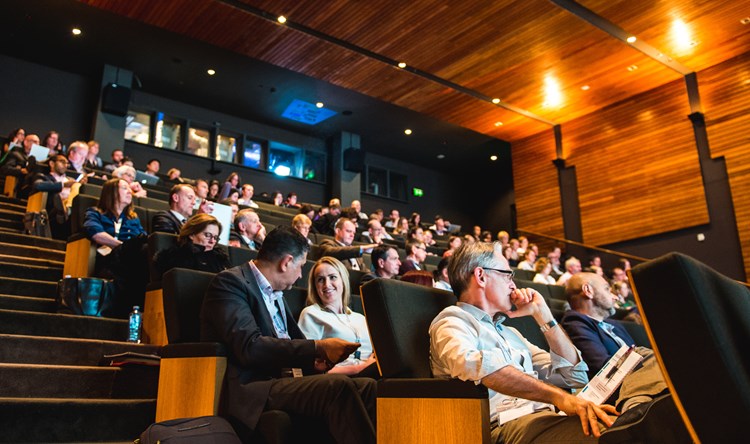
On Friday August 4th, 150 delegates representing more than 70 Australian Genomics partner organisations gathered in Brisbane for the Australian Genomics National Conference; the first national meeting of Australian Genomics since being awarded a $25million research grant to provide evidence for the sustainable implementation of genomic medicine into Australia’s healthcare.
Shane Porter (Assistant Secretary, Strategic Policy Branch, Australian Government Department of Health), opened the conference, presenting the Department’s progress on a National Health Genomics Policy Framework, commenting “It is so encouraging to see the collaboration of many institutes toward a consistent and coordinated approach for genomic healthcare. The alignment of the Framework’s priority areas with initiatives across the Australian Genomics network supports the successful implementation of this Framework”. Later in the day Professor Meredith Makeham represented the Government’s Australian Digital Health Agency, describing the Agency’s progress to date in an ambitious workplan.
Professor Kathryn North (Murdoch Children’s Research Institute and Lead, Australian Genomics) welcomed delegates and spoke of the growth of the Australian Genomics program since its launch in 2016, commenting “The conference today showcases tremendous progress through Australian Genomics partnerships and initiatives. In just eighteen months we have grown from 30 partner institutes to now almost 80,launched eleven clinical flagship projects, engaged 230 investigators across the country and cemented our linkages with international genomics consortia”. Australian Genomics Program Manager Tiffany Boughtwood followed with an overview of Australian Genomics approaches to operationalise the rapidly growing initiative.
Melbourne Genomics Health Alliance, Queensland Genomics Health Alliance and the Sydney Genomics Collaborative were showcased in talks by Associate Professor Clara Gaff, David Bunker, and Associate Professor Marcel Dinger.
Dr Zornitza Stark (Victorian Clinical Genetics Services) presented Melbourne Genomics’ recent publication demonstrating the diagnostic efficacy of whole exome sequencing (WES). WES greatly improved the diagnostic rate for childhood genetic conditions when used as an early test, and was far more cost-effective than current diagnostic approaches. The work also importantly demonstrated the significant impact of gaining a diagnosis on future reproductive choices. Queensland Genomics has recently launched its new clinical demonstration projects and capability-building work streams, and Sydney Genomics Collaborative projects have marked many milestones, undertaking whole genome sequencing of thousands of individuals to better understand simple and complex genetic disease, and providing diagnoses to hundreds of families.
Dr David Hansen (Australian eHealth Research Centre and co-lead of the Data Federation and Analysis Program) highlighted the Program’s progress in mapping barriers to data sharing, surveying current laboratory practices to enable solutions for variant classification and sharing, and establishing mechanisms for the exchange of clinical and genomic information. Professor John Christodoulou (Murdoch Children’s Research Institute and co-lead of the National Diagnostic Network Program) outlined how this Program is formulating recommendations for a more streamlined, standardised approach to clinical consent to resolve current challenges in the patient consent process for genomic testing.
Professor Sylvia Metcalfe (Murdoch Children’s Research Institute and co-lead of the Workforce, Education and Ethics Program) provided early insights into the education needs of non-genetic health professionals in Australia. Professor Robyn Ward (The University of Queensland and co-lead of the Policy, Economics and Implementation Science Program) provided an Australian perspective on the challenges faced by medical reimbursement agencies to properly evaluate large-scale genomic tests for public subsidy, while ‘keeping up’ with the rapid advance of genomic testing into care.
Other highlights from the day included a presentation from Richard Vines (Rare Cancers Australia & Chair of the Australian Genomics Community Advisory Group) on the importance of clear and accurate messaging on genomics for the public. Richard introduced Australian Genomics’ newest initiative, ‘Genomics in the Community’, which is partnering with patient advocacy groups to develop accessible information materials for patients and the community.
Professor David Thomas (Kinghorn Cancer Centre and Lead, Managing Patient Risk – AYA/Paed Flagship) and Dr Andrew Mallet (Royal Brisbane & Women’s Hospital and Lead, KidGen Renal Genetics Flagship) showcased their Flagships, later joining their Cancer and Rare Disease Flagship counterparts in lively panel discussions, revealing the leaders’ visions for the next five years, the challenges faced and lessons learnt in their roles, and exploring where Flagships and Programs intersect and work together.
The afternoon featured the launch of the Australian Functional Genomics Network. Professor Andrew Sinclair (Murdoch Children’s Research Institute and co-lead, Australian Genomics) introduced the new network, established to connect diagnostic laboratories and clinicians with researchers who can investigate the functions of newly discovered genes and/or the functional consequences of the gene variants.
The conference concluded with the announcement of Australian Genomics PhD scholarships in project areas aligned with Australian Genomics. Professor Kathryn North said “I’m delighted to be awarding scholarships to these outstanding PhD candidates; these awards are supported by Australian Genomics to build capacity of our future workforce and foster emerging leaders in genomic medicine.”
It is so encouraging to see the collaboration of many institutes toward a consistent and coordinated approach for genomic healthcare. The alignment of the Framework’s priority areas with initiatives across the Australian Genomics network supports the successful implementation of this Framework.
The conference today showcases tremendous progress through Australian Genomics partnerships and initiatives. In just eighteen months we have grown from 30 partner institutes to now almost 80, launched eleven clinical flagship projects, engaged 230 investigators across the country and cemented our linkages with international genomics consortia
See images from the day.

